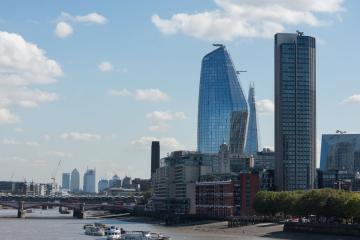UK Property feels Brexit pinch but offers opportunities
 Years of rapid price growth made property in Britain some of the most expensive in the world, and lured overseas investors eager to ride a wave of rising prices.
Years of rapid price growth made property in Britain some of the most expensive in the world, and lured overseas investors eager to ride a wave of rising prices.
With the UK’s deadline to leave the EU just over two months away, all eyes on the real estate market and how it will behave when – or if – Brexit becomes a reality this year.
Brexit chaos is battering the UK property market, but other investors with an appetite for volatility are snapping up real estate in the country.
Years of rapid price growth made property in Britain some of the most expensive in the world, and lured overseas investors eager to ride a wave of rising prices.
There is a general consensus that returns and capital values will weaken in 2019, but the degree to which is unknown. The uncertainty has pushed some investors into two distinct camps: those avoiding the market full stop, and others are preparing for opportunities that arise from the anticipated disruption.
The latest consensus forecast published by the Investment Property Forum (IPF) shows most investors expect, on average, returns to slow and capital values to move into negative territory.
According to IPF, the commercial real estate outlook for 2019 is weaker for most markets, with the exception of the industrial sector.
Total returns are expected to drop from 6.2% this year to 3% in 2019, while capital values will fall across all sectors – except for industrial where they will rise by 2.7%.
Capital Economics agrees and says a gradual upward movement in yields over the coming years is expected to result in returns slowing further.
“Despite this, neither us, nor the IPF Consensus, expect the commercial property sector to experience a hard landing,” the economic research consultancy says.
“Despite the risk of a no-deal Brexit, the central view of both us and the IPF Consensus is that the commercial property sector will experience a soft landing.”
In fact, even under a no-deal Brexit, Capital Economics expects values to only fall by between 5% and 9% over two years. “based on worst-case assumptions designed to stress test the banking system”, rather than providing “plausible forecasts”.
Does Brexit spell trouble for UK commercial property or land of opportunity?
Paul Crosbie, who manages M&G value-add real estate funds in the UK, thinks Brexit uncertainty is leading to “fundamentals being overlooked and [the] perceived risk overstated at times”.
He says: “This creates a unique opportunity to buy well located, good-quality assets that need attention – perhaps they have a gap in income, or require some capital expenditure.
By “enhancing the income profile of these assets”, Crosbie says M&G can “create value through clever asset management, effectively repositioning them to a grade-A, core-quality standard”.
Crosbie explains that after the referendum result in 2016, there was a short, sharp drop in pricing in capital markets. Core assets quickly recovered; non-core did not and this divergence has continued throughout the Brexit process.
According to Crosbie, fundamentals remain strong with robust levels of tenant demand, yet restricted supply of quality new space.
The M&G UK Enhanced Value Fund (UKEV), was launched early in 2018 to target mispriced assets and take advantage of the risk aversion created by the political uncertainty.
“Since launching the fund in the first quarter, we have assembled a diverse portfolio of well-located, income-producing assets with a geographic focus on London and the south, Crosbie says.
“These assets are well placed to ride through any further Brexit storm. Moreover, the fund is designed to take advantage of any further dislocation in pricing with a three-year investment window if a disorderly Brexit ensues.”
The latest European Regional Economic Growth Index (E-REGI), published by LaSalle Investment Management shows that London remains the leading city for real estate occupier demand in Europe.
The E-REGI index – made up of nearly 300 regions in 32 European countries – puts London top for a second successive year, narrowly beating Paris.
LaSalle, however, says the index “offered evidence that London’s resilience in the run-up to the UK’s exit from the European Union was not mirrored by the rest of the UK”.
Gramercy Europe which invests across Europe excluded the UK market for its most recent fund and CEO Alistair Calvert says the company might do the same for its next fund.
Calvert, who led a management buyout of Gramercy Europe from Blackstone in October, says this was to avoid discussions with prospective investors becoming bogged down with debates about Brexit.
That said, Calvert believes opportunities in UK logistics could arise as a result of a “disorderly Brexit” that creates “inefficiencies” and “friction” in trade and the transport of goods.
This and the stockpiling of goods could increase the demand for logistics facilities, he says.
Ludo Mackenzie, the head of commercial property at Octopus Property, says: “While we continue to see wider market volatility as a result of the ongoing Brexit process, it remains our view that any repercussions cannot be generalised, and there will inevitably be some winners and some losers within the real estate sector.”
Mackenzie says Octopus, a specialist UK property lender, is seeing increased appetite from institutions, from pension funds and asset managers through to mainstream banks, looking to move away from direct lending but remain exposed to the favourable returns the sector has on offer via credit lines to specialist lenders.
“Some sectors, industries and geographies will undoubtedly be adversely impacted by Brexit, while others will potentially benefit,” he says. “We continue to see a shift in borrower appetite away from the high-street banks in favour of non-bank lenders, something that we don’t expect to change course in the foreseeable future.”
Most Popular
Big sub-Saharan African economies to get potent lift this year
Sub-Saharan Africa’s biggest economies will benefit from a global upswing this year - as long as the U.S.-China tariff dispute does not disturb improving global trade flows, a Reuters poll ... Full story










